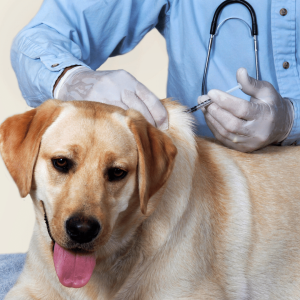Dog Vaccines: Which Shots Does Your Dog Need?

Contents
If you’re wondering which shots your dog or puppy really needs, you’re not alone. Dog vaccines are extremely important, but you don’t want to expose your dog to unnecessary discomfort either. Your dog is just as susceptible to illness as any human, and his lifestyle, age, and other risk factors play a role in determining which shots and boosters are required.
In this guide to puppy and dog vaccines, we’ll discuss which shots are required by law and which shots are vital to your dog’s health. We’ll also discuss which vaccines your dog should have before boarding, getting groomed, visiting the dog park, and traveling.
So, which shots does your dog really need? There’s a lot to cover, so let’s dive right in!
Core Dog Vaccines: The Shots Every Dog Really Needs
Core vaccines are the essential shots every dog must have. Here’s a look at each canine core vaccine, what it’s for, and when your dog or puppy should have it.
· Rabies Vaccine
Rabies vaccines are required by law in most states for dogs and puppies, so every dog must be kept up to date on this vaccine. This vaccine protects your dog from a fatal viral disease that is spread by the bites of infected animals.
Puppies should receive their first rabies vaccine when they are 10 – 12 weeks old. Adult dogs should have a rabies booster every one or three years, depending on which type of vaccine your veterinarian uses.
Although reactions to the rabies vaccine are rare, they can occur right away or within a few days of the injection. If your dog develops a fever, swollen lymph nodes, tenderness at the injection site or in the joints, hives, or diarrhea after being vaccinated for rabies, contact your vet immediately.
· Canine DHPP Vaccine
The canine DHPP vaccine may not be required by law. However, it protects your dog from several contagious diseases, and it is considered a core vaccine that all adult dogs and puppies should have. The DHPP vaccine protects against distemper, hepatitis (adenovirus), parainfluenza, and the deadly parvovirus.
Puppies will receive a series of three DHPP vaccines at 6 – 8 weeks, 10 – 12 weeks, and the final booster at 14-16 weeks. Adult dogs should have a booster DHPP vaccine one year after their last puppy shot and then once every three years throughout their life.
Reactions to the DHPP vaccine are rare, but they can be severe. If your dog develops seizures, itching, vomiting, diarrhea, or other allergy symptoms after receiving this vaccine, call your vet right away.

Non-Core Dog Vaccines: Shots Your Dog Might Need Depending on Lifestyle and Other Factors
Depending on your dog’s age, where you live, and his lifestyle, he may or may not need additional non-core dog vaccines. Here’s a look at what’s available, which one’s your dog might need, and when.
· Canine Lyme Borreliosis Vaccine
Canine Lyme borreliosis vaccine fights the bacteria in deer tick bites that cause Lyme disease. If you live in an area where deer ticks are common, your dog should have this vaccine twice when he’s a puppy, followed by an annual booster throughout adulthood.
· Bordetella
Bordetella, or kennel cough, is a highly contagious respiratory illness that can spread in dog boarding facilities, grooming shops, and dog parks. The first Bordetella vaccine can be given to puppies when they are six to eight weeks old, and then once or twice a year throughout adulthood, depending on your vet’s recommendation. Many boarding facilities require that dogs are vaccinated for Bordetella every six months.
· Leptospira
In some states, Leptospira is considered a core vaccine and it is given in combination with the DHPP vaccine, making it a five-way DHLPP shot. It can also be given as a stand-alone vaccine. This vaccine protects against a deadly bacterium that’s found in infected urine or contaminated water and soil.
Leptospirosis is more common in certain states, like California. If your vet recommends the Leptospira vaccine for your area, it will be given on the same schedule as DHPP. Occasional side effects include loss of appetite and lethargy.
· Canine Influenza H3N8 and H3N2
Canine influenza vaccines are relatively new. Their job is to protect your dog from getting two types of flu that lead to respiratory symptoms and possible pneumonia. Much like the human flu vaccine, they will not prevent your dog from getting canine flu, but dogs who are vaccinated have milder symptoms that don’t last for very long.
Dogs are more likely to be exposed to canine influenza in boarding facilities, at the groomer, at the dog park, or in other places where dogs might gather. If you and your vet decide your dog should receive the canine influenza vaccines, they are given twice when he’s a puppy and then once per year throughout adulthood.
Canine coronavirus (CCV) IS NOT the same coronavirus that causes COVID-19 in humans. CCV causes gastrointestinal issues in dogs that go away in a few days, and it IS NOT transmittable to humans. The disease is passed from dog to dog through infected saliva and feces.
Dogs who contract CCV may experience diarrhea, poor appetite, lethargy, and possibly mucus or blood in the stool. The condition usually resolves on its own and is generally only a serious problem for dogs with compromised immune systems. Vaccination is not generally recommended because the illness is not life-threatening or serious.
Are booster vaccines really necessary?
Many people wonder if booster vaccines are really necessary. There is some evidence that vaccines may provide more than a year of immunity, which means they may not be needed as often.
If you’re concerned about over-vaccinating or allergic reactions, you can ask your vet to do a titer test. This test measures the number of antibodies in your dog’s blood to determine his immunity status. The test will tell you which vaccines he truly needs at the current time.
Keep in mind that most states and counties require a rabies vaccine every three years. You probably won’t be able to skip the rabies vaccine based on a titers test.
Either way, don’t skip your dog’s booster shots without your vet’s approval. This will put your dog at risk for life-threatening and preventable diseases and cost you more money in the long run if he gets sick. There are lots of ways to save money on routine veterinary care, so don’t let that be an obstacle that prevents you from staying on top of your dog’s vaccines.
Things to Consider Before Getting Your Dog’s Vaccines
When considering which vaccines your dog should have, your veterinarian is your best resource. Every dog should be kept up to date on the core vaccines unless he is severely allergic to them. Here are some things to think about before vaccinating your dog or puppy.
1. Age
Don’t vaccinate puppies when they’re too young because their immune systems are too weak to handle the vaccines. The first shots your puppy receives should be given at 6 to 8 weeks of age. The same rule applies to senior dogs who may have compromised immune systems. Your vet may recommend going longer between boosters or even skipping them completely when your dog reaches a certain age.
2. Number of Vaccines
Don’t give too many vaccines at once. Prioritize the core vaccines and space out the non-core vaccines so that your dog isn’t receiving too many shots at once.
3. Size
Tiny dogs or dogs who are underweight are more likely to have an adverse reaction to vaccines. In this case, most vets recommend administering only the core vaccines.
4. Allergies
If your dog has ever had a reaction to a vaccine, be sure to let your vet know. In most cases, your vet will not administer that vaccine again. Non-core vaccinations may not recommend at all in this case.
5. Overall Health
Don’t take your dog in for shots when he’s not feeling 100% because dog vaccines can put a strain on the immune system. Wait until he’s fully recovered from illness, injury, or surgery before vaccinating.
Final Thoughts
If your wondering which vaccines your dog really needs, this guide should help you decide. Don’t hesitate to consult with your vet for advice as well. He or she will know which diseases are prevalent in your area and will be able to make recommendations based on your dog’s lifestyle. Keeping your dog up to date on vaccinations is crucial to his overall health and a huge part of being a responsible dog parent.
